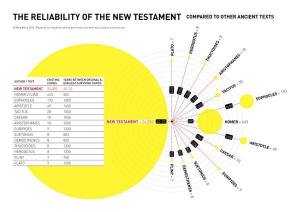Objections: Can the Bible Prove Itself?
Part 1: “Unity in Diversity”
It’s as if he were saying, “I’m speaking to you on every available frequency. Are you listening?”
The last post briefly surveyed the evidence that the Bible we read today is essentially the same as it was when it was written. That makes it a collection of Reliable texts. But that doesn’t necessarily mean that the events reported in the original manuscripts were real. Is it possible that the Bible we have today is an entirely accurate reproduction of ancient fraudulent documents? Could the events reported in the Bible have been fabricated? If so, Christianity is the greatest hoax ever to have been perpetrated against humanity! If not, the implications are far reaching…
Are there reasons to believe that the Bible is not only faithful to the original documents, but a truthful account of ancient events? In this post, we’ll have a look at the evidence within the Bible itself, as opposed to historical and current evidence from outside the Bible. We would say these are “internal” and “external” evidence for the truth of Scripture.
Internal Evidence Does it make sense to use the Bible to show that the Bible is true? What if I were to rent an office, buy a lab-coat, selling my services as a physician? People might ask, “Why should I believe you are a doctor?” If I respond, “Because I say I am a doctor”, there isn’t a good reason to trust my medical opinion.
Isn’t that the same thing as using the Bible to show that the Bible is true? Not really. The Bible isn’t actually one book, but a corpus of writings. It is like an entire library of “peer reviewed” material. The Protestant Bible is composed of 66 individual books, in a variety of genres, written by 40 different people from every walk of life, in 3 different languages, on 3 different continents, over a period of roughly 1500 years. The amazing thing is they all talk about the same person. No other religion has this type of authentication or pedigree.
Just for fun, imagine that there was a supernatural being who created everything in existence. Let’s also suppose that this being wants to be known by humans and have a relationship with them. How would he make himself known to us? In the event that there is a creator who wants us to know him and have a relationship with him, the Biblical books (and God’s recorded activities therein) are entirely consistent with the types and consistency of messages he would give. In other words, God might reasonably be expected to use every available means of communication, and each would say the same thing. Unity within diversity.
The Protestant Bible is composed of 66 individual books, in a variety of genres, written by 40 different people from every walk of life, in 3 different languages, on 3 different continents, over a period of roughly 1500 years.
What does that mean? Think about ideas and beliefs for a moment. The ideas that people have are constantly changing. We have ideas about the meaning of life. Ideas about families. Ideas about government. About music. About God. Fifty years ago, popular opinion on each of these topics was radically different from what it is today! If the Bible were written based on popular opinion about God and life, the “truth” would shift dramatically in the space of 1500 years. Yet, the Biblical record shows us the same picture of God throughout centuries. This is what the term “unity of scripture” means.
“Diversity” indicates the nature of Biblical texts to reflect cultural influences of their time. For instance: the first 5 books of the Bible are written by Moses, who was raised in the Egyptian Royal Court. He would have been familiar with the language known as “Akkadian”, and we would expect to see the influence of that language in his writing (if we were familiar with ancient near eastern languages). Is that what scholars see? Yes. Another example? Okay, in the “exilic” books (written when the Jews were deported to Babylon) we would expect to see the influence of the Chaldean (Babylonian) language, which is the case. Each book reflects unique stylistic traits of its human author (divinely inspired), yet maintains the same, ancient ideas about its divine author.
Not only are the themes of Biblical books consistent throughout, they come in multiple literary genres (poetry, historical narrative, personal correspondence, etc.) and contain accounts of miracles performed by God and others, for the purpose of vindicating his message. It’s as if he were saying, “I’m speaking to you on every available frequency. Are you listening?”
One type of miracle in particular is used multiple times in the Bible: prophecy. Predictive prophecy is especially effective at demonstrating that the Bible should be taken at face value. The next post will give a basic introduction to predictive prophecy as internal evidence for the truth of the Bible.











